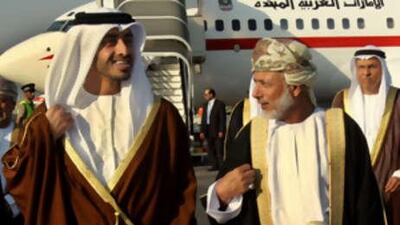MUSCAT // GCC leaders are today expected to hammer out a shared position on the Israeli attacks in Gaza before a proposed emergency meeting of the Arab League later this week. The attacks on the Palestinian territory will dominate the GCC's 29th summit in Muscat, overshadowing other pressing regional issues such as joint infrastructure projects, the international financial crisis and moves towards a monetary union. Speaking after the summit's opening ceremony, Abdulrahman al Attiyah, the GCC secretary general, said Gaza was "one of hottest issues in this summit, in addition to issues of mutual co-operation". "The GCC stated position is the collective support of the Palestinian question and supporting our brothers in Gaza," he said yesterday. "The massacres and bloody series committed by the Israeli occupation forces in Gaza is something that there will be meetings about today and tomorrow at all levels to be reflected in the summit's [closing] statement." Last night the UAE's Federal National Council issued a statement urging the Arab League and other international organisations to act immediately to stop the aggression. The council described the attacks as a "flagrant violation of the principles of international humanitarian law and the Geneva Conventions and all international charters and norms". The FNC members said the Arab League, the Security Council and the international community must act urgently to exert maximum pressure to stop the massacres in accordance with UN charters, according to the state news agency, WAM. There have been reports that the GCC meeting could be followed by an Arab summit in Doha on Friday. Qatar and Syria are among nations to have called for an emergency meeting of Arab leaders tomorrow. The GCC leaders are expected to try to reach a common position that they can take to the pan-Arab gathering. Other significant issues facing the bloc will also be discussed today. Qaboos Bin Said, the Sultan of Oman, stressed the importance of working together with "international parties to address [issues that] can lead to correcting the situation and bring back economic and social development." The financing of a key pan-region infrastructure project, the 1,940km rail network connecting the GCC nations, is on today's agenda. The global financial crisis has prompted some states to cancel or postpone other large-scale projects and financing for the US$14billion (Dh51bn) rail deal is expected to be a subject of debate. The GCC states have been hit by the global crisis, prompting governments to take steps to prevent collapse of the financial system. The UAE Government has funded a Dh120bn package through the Ministry of Finance and the Central Bank to support banks operating in the country. At least Dh50bn of that sum has been pumped into the banks, including foreign companies with "core operations" in the Emirates. The GCC leaders are also scheduled to reach an agreement paving the way for a common Gulf monetary union during the summit, which finishes today. They will also decide on the location of the union's headquarters, officials said. Mr al Attiya said the leaders are discussing requests by four GCC states to host the Gulf monetary council. When asked whether a decision was imminent, he said: "Inshallah." The UAE, Saudi Arabia, Qatar and Bahrain have all applied to host the headquarters, which would also be home to the central bank for the region's single currency. Oman announced in 2006 that it would not join common monetary regime. A year later, Kuwait dropped its link to the dollar and pegged the dinar to a basket of currencies, complicating the introduction of a common currency. "Oman will not join the monetary unity project in 2010 and not even in 2100," Yousuf bin Alawi, Omani minister in charge of foreign affairs, told an Arabic-language daily this week. The heads of the Gulf states are also due to discuss the situation in Iraq, relations with Iran, Yemeni-Gulf relations, the stand-off between India and Pakistan and the issue of piracy in the Gulf of Aden. They will touch on plans by Gulf states for peaceful nuclear energy programmes and their co-operation with the International Atomic Energy Agency. Earlier yesterday, Sheikh Khalifa bin Zayed, President of the UAE and Ruler of Abu Dhabi, was quoted in a statement as saying: "We are very confident that we will reach positive resolutions in this summit that will boost the achievements of our co-operation. "This summit is very important as it takes place under very critical regional and international circumstances." mhabboush@thenational.ae

Attacks take centre stage for GCC
Leaders of all six GCC nations arrive in Muscat for its 29th summit, with Israel's raids on Gaza expected to top their agenda.
Most popular today
